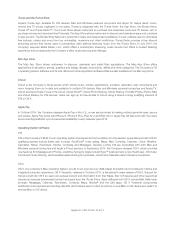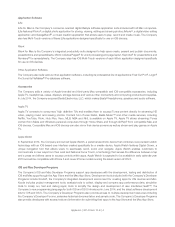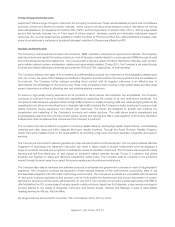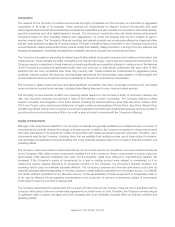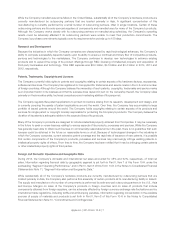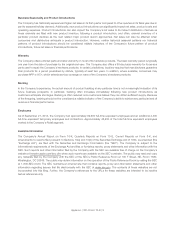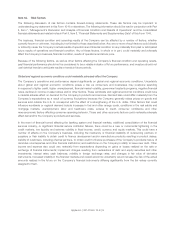Apple 2014 Annual Report Download - page 15
Download and view the complete annual report
Please find page 15 of the 2014 Apple annual report below. You can navigate through the pages in the report by either clicking on the pages listed below, or by using the keyword search tool below to find specific information within the annual report.The Company relies on access to third-party digital content, which may not be available to the Company on commercially
reasonable terms or at all.
The Company contracts with numerous third parties to offer their digital content through the iTunes Store. This includes the
right to make available music, movies, TV shows and books currently available through the iTunes Store. The licensing or other
distribution arrangements with these third parties are for relatively short terms and do not guarantee the continuation or renewal
of these arrangements on reasonable terms, if at all. Some third-party content providers and distributors currently or in the
future may offer competing products and services, and could take action to make it more difficult or impossible for the
Company to license or otherwise distribute their content in the future. Other content owners, providers or distributors may seek
to limit the Company’s access to, or increase the cost of, such content. The Company may be unable to continue to offer a
wide variety of content at reasonable prices with acceptable usage rules, or continue to expand its geographic reach. Failure to
obtain the right to make available third-party digital content, or to make available such content on commercially reasonable
terms, could have a material adverse impact on the Company’s financial condition and operating results.
Some third-party digital content providers require the Company to provide digital rights management and other security
solutions. If requirements change, the Company may have to develop or license new technology to provide these solutions.
There is no assurance the Company will be able to develop or license such solutions at a reasonable cost and in a timely
manner. In addition, certain countries have passed or may propose and adopt legislation that would force the Company to
license its digital rights management, which could lessen the protection of content and subject it to piracy and also could
negatively affect arrangements with the Company’s content providers.
The Company’s future performance depends in part on support from third-party software developers.
The Company believes decisions by customers to purchase its hardware products depend in part on the availability of
third-party software applications and services. There is no assurance that third-party developers will continue to develop and
maintain software applications and services for the Company’s products. If third-party software applications and services cease
to be developed and maintained for the Company’s products, customers may choose not to buy the Company’s products.
With respect to its Mac products, the Company believes the availability of third-party software applications and services
depends in part on the developers’ perception and analysis of the relative benefits of developing, maintaining and upgrading
such software for the Company’s products compared to Windows-based products. This analysis may be based on factors
such as the market position of the Company and its products, the anticipated revenue that may be generated, expected future
growth of Mac sales and the costs of developing such applications and services. If the Company’s minority share of the global
personal computer market causes developers to question the Mac’s prospects, developers could be less inclined to develop or
upgrade software for the Company’s Mac products and more inclined to devote their resources to developing and upgrading
software for the larger Windows market.
With respect to iOS devices, the Company relies on the continued availability and development of compelling and innovative
software applications, which are distributed through a single distribution channel, the App Store. iOS devices are subject to
rapid technological change, and, if third-party developers are unable to or choose not to keep up with this pace of change,
third-party applications might not successfully operate and may result in dissatisfied customers. As with applications for the
Company’s Mac products, the availability and development of these applications also depend on developers’ perceptions and
analysis of the relative benefits of developing software for the Company’s iOS devices rather than its competitors’ platforms,
such as Android. If developers focus their efforts on these competing platforms, the availability and quality of applications for
the Company’s iOS devices may suffer.
The Company relies on access to third-party intellectual property, which may not be available to the Company on
commercially reasonable terms or at all.
Many of the Company’s products include third-party intellectual property, which requires licenses from those third parties.
Based on past experience and industry practice, the Company believes such licenses generally can be obtained on reasonable
terms. There is, however, no assurance that the necessary licenses can be obtained on acceptable terms or at all. Failure to
obtain the right to use third-party intellectual property, or to use such intellectual property on commercially reasonable terms,
could preclude the Company from selling certain products or otherwise have a material adverse impact on the Company’s
financial condition and operating results.
Apple Inc. | 2014 Form 10-K | 13


